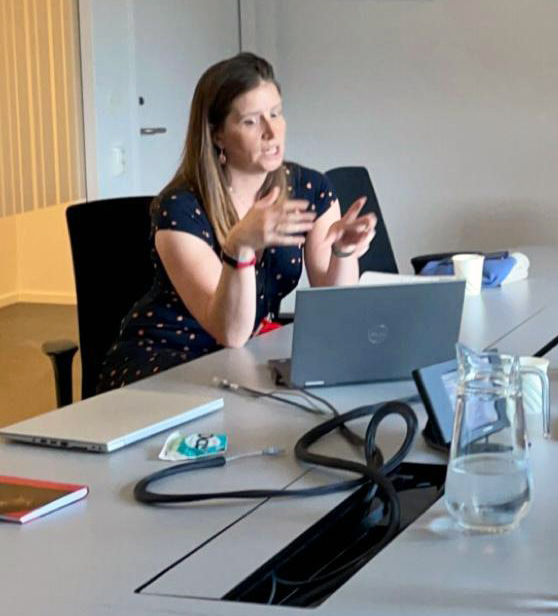Rosalynn Austin from the University of Southampton visited the Department of Public Health to discuss health promotion for people with health challenges. She comments on benefits of researcher mobility.
“The visit was part of a National Institute of Health and Care Research (NIHR) Applied Research Collaboration (ARC) Researcher Enhancement award that I was awarded this fall”, states Rosalynn Austin.
Her supervisor for this award, Alison Richardson, works with Professor Anne Marie Lunde Husebø on the "eHealth @ Hospital-2-Home" project at UiS. She thought this would be a good opportunity for Austin to observe the research that Husebø is leading at UiS. Health-promoting perspectives are becoming increasingly important for people living with various health challenges. Development of knowledge and interventions are necessary to enable people to cope with everyday life and to promote health. The UiS project “Health promotion for people with health challenges”, in the research area ProHealth, addresses such issues.
Joint research areas

I understand that you especially worked with the “Health promotion for people with health challenges”-project. How is the spillover value from the project to your own research?
“I have just finished my PhD which sought to better understand how symptoms of heart failure interact with burden of treatment. The next step for my work is to develop an intervention that will apply the learning in the project and work with clinicians and patients to develop an intervention that will aim to make their experience better. The project that Prof Mia is leading was similar built on work around burden of treatment in heart failure and cancer patients and it aims to improve patients experiences in the immediate period after a hospital admission. Their experience in creating and delivering such and intervention helped me to better understand the process and learn from their experiences. I believe this will make my future work better”, answers Austin.
She completed her PhD at the University of Southampton as a “clinical academic”. This means that in addition to doing her PhD she also worked as a Specialist Research Nurse at the Portsmouth Hospitals University NHS Trust (PHU).
“This has given me unique experience around research delivery across multiple study types. My advice to the team here at UiS was based on that experience and things I wished I had done in my study, as well as things that I received really nice feedback on from participants and collaborators. For example, as a research nurse we do a lot of follow-ups with participants and they all want to know the results of the studies they have participated in”, states Austin. As a researcher nurse she was however limited by what the researcher had decided to do. Often this meant participants did not receive the research results. As a researcher in her PhD, Austin made the decision to ensure that she communicated the results to her participants. In addition to sending them thank you letters, the Canadian also posted summaries and links to the results on the study blog.
Encourages increased researcher mobility
This was Austin’s second trip to Stavanger. Due to a hip that needs surgery she could not adventure as much as she would like. Her favorite non-academic activities this time were the meals and informal chats with Professor Husebø. These happened at restaurants, the latter’s home, and the island of Hundvåg; visiting Trollskogen and Spiselig Hage’s garden and café. In addition to this Austin also took ferries to explore the waterways and many islands around Stavanger. She recommends this for any visitors to the city, as you get to see beautiful places without needing a car.

You are trying to develop an international visit for Professor Anne Marie Lunde Husebø. What do you think should be done to bring about more similar arrangements?
“The great news is that the arrangements around Prof Mia to come and visit researchers is well underway. I think this is one of the benefits of researcher mobility as it opens your eyes to connections that might be beneficial for those who you meet during a visit to also expand their networks. As far as supporting more international visits I’d encourage any researcher out there to reach out to others in similar fields to email and ask if that would be something that a given researcher would be interested in setting up. As far as supporting these visits it would be great to see professional nursing groups and educational institutions offering more funding to facilitate these visits. I was supported by the ProHealth group (UiS), NIHR ARC, and PHU. Without their combined support this visit would not have been possible”, answers Austin.
In this case the advantages of researcher mobility according to her includes having benefited from a visit to UiS and the interesting research that Prof Mia is leading in the ProHealth group. Austin believes very strongly in the idea of researcher mobility, as it builds your research network, increases your exposure to more research methods and styles, and let you meet other researchers. It means that you gain a better understanding of research development and production in countries other than where you are based. All this experience helped her to continue to grow and develop as a researcher and a leader.
“If reading this has piqued your interest in an international visit but you’re not sure where to start, I’m happy to be contacted”, she concludes.
Text: Eigil Kloster Osmundsen